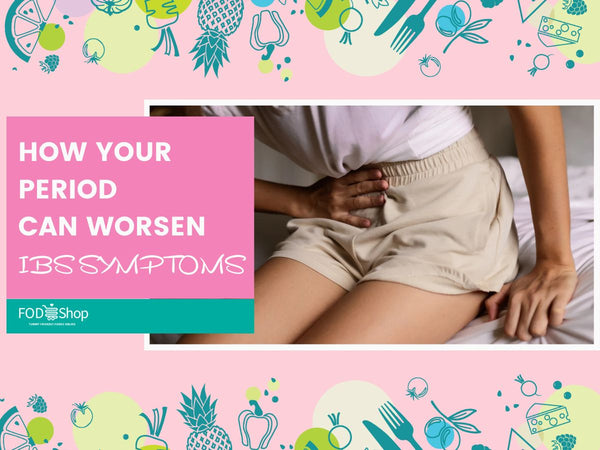- Ph: +61 435 003 412
- operations@fodshopper.com.au
"Organic Orange" has been added to your cart. View cart
"Organic Orange" has been added to your cart. View cart

Irritable bowel syndrome (IBS) is a functional gut disorder and is experienced in around 8.8% of people worldwide, mainly women. (1) The causes of IBS remain unknown however, risk factors for IBS include the female sex, family history of IBS, and anxiety or depression. (1)
During a woman's cycle, hormones fluctuate. There are three phases in your cycle including: the follicular phase, ovulation, and the luteal phase, which is when your period begins. During this time, levels of oestrogen and progesterone drop, causing exacerbated symptoms in women with IBS.
Keep reading to find out why this occurs and what you can do to manage your symptoms on your period.
Sex hormones have been suggested to play a pivotal role in IBS symptoms due to their daily interactions with the gut. (1) Studies have shown that female sex hormones affect the gut-brain axis, causing an impact to stress, gut motility, and pain perception. (2) With the connection between the gut and brain being so strong, it is no wonder how the drop in mood on one's period can affect the gut's sensitivity and tolerance. (3)
One study researched the impact of menstruation and the menstrual cycle on women with IBS and their symptoms. (1) It found that women on their periods often suffer from exacerbated symptoms of IBS, such as bloating, abdominal pain, and looser and more frequent stools, whilst constipation was common before the start of each period. (1) More than 50% also experienced bloating at all times of their cycle, decreasing their quality of life, limiting their ability to complete daily tasks, and causing them to seek council at their physician when they were menstruating. (1)
These results can be attributed to the hormones oestrogen and progesterone. (1) Oestrogen and progesterone peak after and before your period and is at its lowest during menstruation. Progesterone controls the gut's motility, and when it is at low levels during menstruation, diarrhoea frequency increases. (1) Oestrogen also modulates pain perception, which can causing abdominal cramping. (1)
The best way to minimise these symptoms on your period is to ensure you are managing your IBS symptoms well. Here are some tips to help this happen.
1. Follow a low FODMAP diet
A low FODMAP diet has been proven to reduce symptoms of IBS including, constipation, diarrhoea, flatulence, abdominal pain, and bloating. (4) Getting on top of your symptoms throughout your menstrual cycle is a great way to prevent any unwanted symptoms on your period. It is especially effective at reducing symptoms when undertaken with an experienced dietitian. (4) To find out why, read the blog HERE on why you need to see a dietitian to effectively follow a low FODMAP diet.
2. Light exercise
Taking part in daily movement is important to reduce period and IBS-related symptoms. Exercise can improve the likelihood of poor mood and lack of concentration. (5) This does not have to be vigorous and could include a light walk, pilates, or yoga.
3. Get enough sleep
Getting enough sleep can help to manage mood swings and balance hormone fluctuations.
4. Manage stress
Since the brain is connected to the gut's function, stress can trigger IBS symptoms. On the other hand, IBS symptoms can cause stress for the individual. If you are struggling to manage your stress levels, it may be a good idea to get in contact with your GP, psychologist, or Accredited Practising Dietitian.
5. Try a dietary fibre supplement
There are a variety of dietary fibre supplements that have been proven to decrease symptoms of diarrhoea and constipation in individuals with IBS. (6) Supplements like Regular Girl, Sunfiber, or Happy Belly PHGG are a great place to start and can be added once daily to water, smoothies, or cereals for a dietary fibre boost.
1. Pati, G. K., Kar, C., Narayan, J., Uthansingh, K., Behera, M., Sahu, M. K., Mishra, D., & Singh, A. (2021). Irritable Bowel Syndrome and the Menstrual Cycle. Cureus, 13(1), e12692. https://doi.org/10.7759/cureus.12692
2. Sex-related differences in clinical symptoms, quality of life, and biochemical factors in irritable bowel syndrome. Choghakhori R, Abbasnezhad A, Amani R, Alipour M. Dig Dis Sci. 2017;62:1550–1560
3. Kammoun, I., Ben Saâda, W., Sifaou, A., Haouat, E., Kandara, H., Ben Salem, L., & Ben Slama, C. (2017). Change in women's eating habits during the menstrual cycle. Annales d'endocrinologie, 78(1), 33–37. https://doi.org/10.1016/j.ando.2016.07.001
4. Magge, S., & Lembo, A. (2012). Low-FODMAP Diet for Treatment of Irritable Bowel Syndrome. Gastroenterology & hepatology, 8(11), 739–745.
5. Aganoff, J. A., & Boyle, G. J. (1994). Aerobic exercise, mood states and menstrual cycle symptoms. Journal of psychosomatic research, 38(3), 183–192. https://doi.org/10.1016/0022-3999(94)90114-7
6. Niv E et al. (2016). Randomized clinical study: Partially hydrolyzed guar gum (PHGG) versus placebo in the treatment of patients with irritable bowel syndrome. Nutrition & metabolism, 13, 10. https://doi.org/10.1186/s12986-016-0070-5

Leave a reply